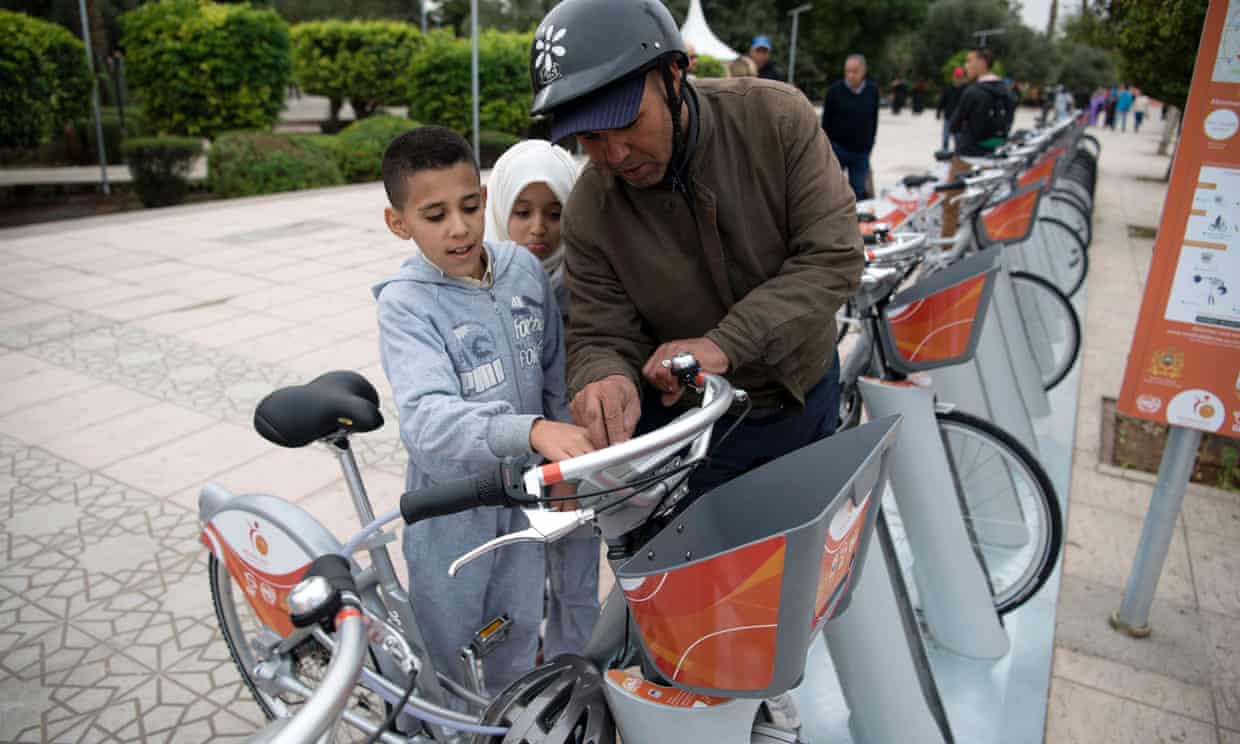With the potential to curb urban congestion, could a successful trial scheme in Morocco act as a launchpad for borrowing bikes across the whole continent?
Moroccans claim you can identify someone as a true Marrakech local if they own a bicycle. The streets of this north African city were once full of ardent cyclists, but in recent decades they’ve been overtaken by scooters and cars that swarm the city’s congested roads.
Now, French bike company Smoove, is trying to revive Marrakech’s biking culture — and boost sustainable transport — by launching Africa’s first fully functioning bike share scheme in the city. The launch coincided with the start of the COP22 climate conference in the city.
“We have made sustainability a part of our constitution,” says Hakima El Haité, COP22 host and delegate minister of the environment for the Moroccan government, which is supporting the scheme. “So now we are implementing.” Along with Marrakech’s new fleet of electric buses that were rolled out in July, the bike share is part of the wider scheme to implement green transport in Moroccan cities, she says.
Smoove, which has also launched bike shares in Helsinki, Chicago, Moscow, and Vancouver, expanded to Marrakech after winning a tender from the United Nations Industrial Development Organisation to start the project. Now its 300 bicycles—called Medina bikes after the city’s ancient centre — will transport cyclists between 10 hubs, stationed at sites across the city like the iconic Koutoubia mosque, and the Jardin Majorelle. “This is providing a modern way of using bicycles again,” says Laurent Mercat, Smoove’s CEO, who started the company in 2008.
They’re working with a local organisation called Estates Vision to maintain the scheme during its five-year contract, and hope the project will win the support of locals due to Marrakech’s history of cycling. “Forty years ago, there were a lot of people, especially women, cycling in the medina. We have some nice black and white photographs where you see that,” says Damien Vander Heyden, Smoove’s business development manager. But, he says, “that has disappeared because traffic makes it impossible to cycle safely in some parts of Marrakech.”
For the new bike share to survive this altered environment, the city’s cycling infrastructure needs some improvement — like the provision of defined cycle lanes on its frequently chaotic roads, Vander Heyden says. “I think it will work, but only if other public organisations help us create the conditions for this. It’s not easy to cycle in Marrakech,” he concedes.
Another challenge is making the bicycles accessible to lower-income locals. Smoove is working to provide different payment options, like cash as well as the credit cards and smartphone apps typically used for bike share schemes, says Mercat. “We don’t want only the wealthy with credit cards to be able to access it,” says Mercat.
But will the price tag — 500 dirhams (£109) for an annual pass, 150 for a week, and 50 for a day — nevertheless deter local users? At roughly €40-45, the yearly fee is more expensive than the bike share system in France, Mercat says, because it’s not buoyed by government subsidies. Still, Smoove sees the price as a helpful deterrent against potential vandalism and theft, Vander Heyden explains. And the interest shown by passers-by — who were witnessed routinely stopping to try out the bikes, take selfies, and pick up pamphlets — suggests the cost is not too severe a deterrent.
Nezha Alami, a consultant who was at one of the bike stations near the conference venue, said she hoped the scheme would come to her home city of Casablanca in Morocco. “I use [bike shares] in Paris, Lisbon, Barcelona; it’s very practical,” she says. “Casablanca needs this kind of project. It’s a big city, and it’s difficult to travel by car. I think it would have big success there.” Indeed, the Marrakech scheme is the first step for expansion into more Moroccan cities, as well as other African locations, where bike shares could curb urban congestion.
Globally, bike share schemes have a patchy record, peppered with theft problems, financial insecurity, and failed uptake. And in the African context the challenges will be unique. In Kenya for instance, where the University of Nairobi recently launched a small-scale pilot bike share on its campus, researchers noted that cycling is associated with poverty — which could be a barrier to adoption.
But so far, Cote d’Ivoire, South Africa, and Kenya have already expressed interest in Smoove, says Mercat, who will be meeting with African representatives during COP22 to talk about bringing the bikes to their cities. If the five-year trial works in Marrakech, it could be the launching pad for tailor-made schemes cycling across the continent.
“We hope that many African cities will start asking, could biking be adapted to Africa?” he says.
- Emma Bryce reported from Morocco on a fellowship from the International Reporting Project (IRP)

No comments:
Post a Comment